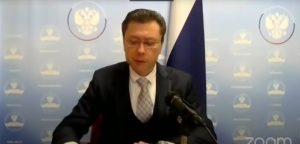
Expressing Russia’s deep desire to see an early negotiated settlement to the India-China border issue, Russia’s Deputy Chief of Mission Roman Babushkin has said that Moscow is concerned over the likely impact of a prolonged standoff which could destabilize the entire Eurasian region. He warned of the risks of a rising escalation that can be “misused by other players in their geopolitical purposes”.
Speaking to reporters in New Delhi on November 12, Mr Babushkin made the remarks during a Q&A session after a briefing on the outcomes of the recent virtual summit of the Shanghai Cooperation Organization (SCO) in which the heads of governments of all eight member countries, and the observers participated. Mr Babushkin also underlined the immense significance of forums such as the RIC (Russia-India-China) and BRICS (Brazil-Russia-India-China-South Africa), which can help “expand common ground and mutual trust”.
“It is feared that amid common turbulence and unpredictability, escalation between India and China would further affect regional instability in our common home Eurasia, while escalation as we are witnessing can be misused by other players in their geopolitical purposes,” he said.India and China are locked in a bitter standoff on the Ladakh border for nearly seven months. Although negotiations are ongoing, including the recent talks between the defence and foreign ministers of the two countries, the stalemate continues over the de-escalation process.
“Russia is in a unique position since it has special strategic partnerships with both India and China and these relationships are independent in nature. We are naturally concerned by the current India-China tensions. However, we believe that a peaceful solution is inevitable [and] better sooner than later,” the Russian diplomat said.
Russia has been urging both sides to resolve their differences at the earliest through a negotiated settlement and any further delay could threaten the peace and stability of the region, he said.He added that the SCO meetings of the defence and foreign ministers of the two sides in Moscow on September 10 had given them an opportunity to discuss the sticking points.
At the time, External Affairs Minister S. Jaishankar and his Chinese counterpart Wang Yi had agreed on a five-point roadmap to end the standoff, which included “early disengagement, maintaining distance between the troops, abiding by all agreements and protocols on border management, and working on new confidence-building measures once the situation eases”.
Mr Babushkin underscored that a “constructive dialogue between our two Asia friends” is important at this point, and “their commitment to exercise restraint and maintain communications through diplomatic and military channels to remove tensions are absolutely welcome”.“India is a global player with multi-faceted and widely diversified national interests and we respect that…India does not provide any reason for doubt when it comes to multilateral and bilateral commitments, even though we know that there are attempts to pressure India and use unfair and illegal competition tools such as threats of sanctions and other restrictions,” he added.
(Sanjeeb Baruah contributed inputs for this article)
Author Profile
- India Writes Network (www.indiawrites.org) is an emerging think tank and a media-publishing company focused on international affairs & the India Story. Centre for Global India Insights is the research arm of India Writes Network. To subscribe to India and the World, write to editor@indiawrites.org. A venture of TGII Media Private Limited, a leading media, publishing and consultancy company, IWN has carved a niche for balanced and exhaustive reporting and analysis of international affairs. Eminent personalities, politicians, diplomats, authors, strategy gurus and news-makers have contributed to India Writes Network, as also “India and the World,” a magazine focused on global affairs.
Latest entries
 DiplomacyJanuary 5, 2026India walks diplomatic tightrope over US operation in Venezuela
DiplomacyJanuary 5, 2026India walks diplomatic tightrope over US operation in Venezuela India and the WorldNovember 26, 2025G20@20: Africa’s Moment – The Once and Future World Order
India and the WorldNovember 26, 2025G20@20: Africa’s Moment – The Once and Future World Order DiplomacyOctober 4, 2025UNGA Resolution 2758 Must Not Be Distorted, One-China Principle Brooks No Challenge
DiplomacyOctober 4, 2025UNGA Resolution 2758 Must Not Be Distorted, One-China Principle Brooks No Challenge India and the WorldJuly 26, 2025MPs, diplomats laud Operation Sindoor, call for national unity to combat Pakistan-sponsored terror
India and the WorldJuly 26, 2025MPs, diplomats laud Operation Sindoor, call for national unity to combat Pakistan-sponsored terror







